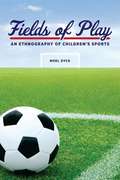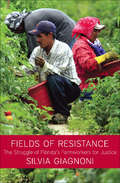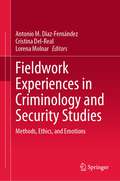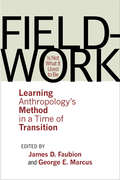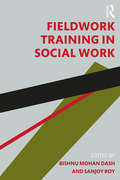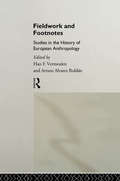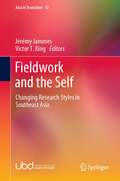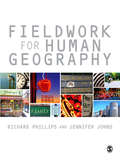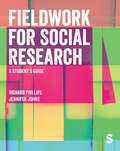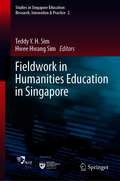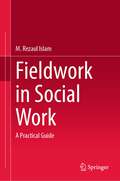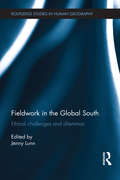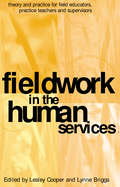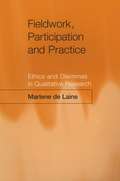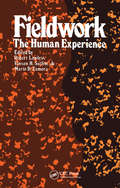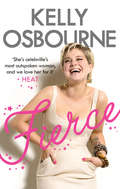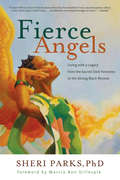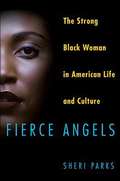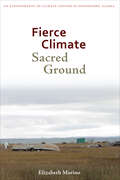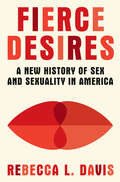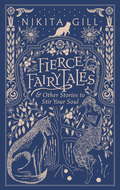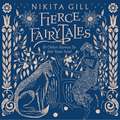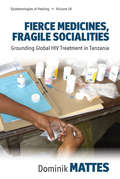- Table View
- List View
Fields of Fortune: 'Viking' Farmers in America
by Robert DodgeA gripping history of one Norwegian immigrant family’s experience in the United States from the mid-nineteenth century to World War II.In the spring of 1853, a family of eight drove their wagon to the wharf in Bergen, Norway. They unloaded their belongings alongside the other stacks labeled, AMERICA, MINNESOTA, ILLINOIS, MICHIGAN, NEW YORK CITY, CHICAGO and boarded the crowded ship.Hopeful, nervous Norwegians—giving up everything for a place they knew of only through second-hand tales of freedom and opportunity—watched as the shoreline retreated, knowing they would never see their homeland again. Their trip ahead would be spent in cramped conditions for two or three months until they reached Ellis Island. The United States, where they were immigrating to, was facing many problems including tensions over slavery and the subsequent beginning of the Civil War.The family moved west to farm the free land that was offered to them but were met with resistance, as it was land that had been cultivated by Native Americans for thousands of years before. The family was nearly eliminated during these times, often referred to as the American Indian Wars.Future generations carried on to the Dakotas and Alberta with difficulties. These Norwegians persisted. Through ardent research and narrative biography, Robert Dodge reflects on the immigrant experience of one Norwegian family from the mid-nineteenth century through World War II in Fields of Fortune: ‘Viking’ Farmers in America.Praise for Fields of Fortune“A thriller, a family adventure, a Viking heritage story that kept me turning the pages and asking for more.” —Alice C. Schelling, author of Hiding Alinka“A riveting tale . . . featuring strong women who carried their families forward even when their men failed them.” —Carolyn Bradley Bursack, author of Minding Our Elders“Award–winning author Robert Doge doesn’t just write history, he paints it in true story-telling style.” —Jodi Bowersox, president of the Colorado Authors League
Fields of Play: An Ethnography Of Children's Sports (Teaching Culture: Utp Ethnographies For The Classroom Ser.)
by Noel DyckThousands of children participate in community sports every year, enjoying recreation time with their peers, getting healthy exercise, and learning a variety of personal and group skills. At the same time, children's sports are not without controversy: parents can be overly invested in their children's exploits, competitive success is often the focus, and rising costs can limit participation. Consider, too, that these activities, billed as being for the kids, are often overlaid with other agendas by the adults who volunteer, work, and generally support children's sports. Noel Dyck incorporates nearly two decades of ethnographic field research into this anthropologically informed account that illustrates how all those involved in children's sports—boys and girls, parents, coaches, and sport officials—shape these complex, vibrant fields of play. In the process, he explores larger questions and debates about contemporary family and community and the shaping of childhood, youth, and adulthood. Bridging anthropology, sport studies, and childhood studies, Fields of Play offers a rich understanding of an area that has, to date, gained relatively little attention by social scientists.
Fields of Resistance: The Struggle of Florida's Farmworkers for Justice
by Silvia Giagnoni“Gignoni tells the stories of farmworkers, mothers, priests, and plutocrats with compassion, poetry, and fierce humanity.” —Raj Patel, author of Stuffed and StarvedMigrant farmworkers in the United States are routinely forced to live and work in unsafe, often desperate, conditions. In response, farmworkers in Immokalee, Florida—known as America’s tomato capital—formed the Coalition of Immokalee Workers (CIW). Against powerful adversaries, the CIW went on to launch nationwide campaigns that have forced the corporate giants of the fast food world—McDonalds, Burger King, and Taco Bell—and grocery industries to concede to their demands for increased wages and just working conditions. As their struggle, and that of immigrants and low-wage workers everywhere, continues, Silvia Giagnoni presents their remarkable story.“Captures the brilliant, difficult, and sustained organizing work of immigrant activists against the megacorporations, such as Taco Bell, Chipotle, and Whole Foods, that profit from their labor. If there was ever any doubt that workers’ rights are human rights, this book will put the notion to rest.” —Vanessa Tait, author of Poor Workers’ Unions: Rebuilding Labor from Below“A sweet victory for social justice. A testament to the tenacity of the Coalition of Immokalee Workers.” —Katrina Vanden Heuvel, editor of the Nation“The Immokalee farmworkers’ heroic struggle for justice in the fields is an inspiring reminder of the value of hope and the power of solidarity.” —Tom Morello, guitarist, songwriter, and activist
Fieldwork Experiences in Criminology and Security Studies: Methods, Ethics, and Emotions
by Antonio M. Díaz-Fernández Cristina Del-Real Lorena MolnarThis book compiles the fieldwork experiences of 55 researchers, addressing the challenges, ethical considerations, and methodologies employed to study 30 diverse populations and phenomena within Criminology and Security Studies. This volume contributes to filling a gap in academic literature by highlighting the often unspoken realities and intricacies of fieldwork. The book is systematically structured into five thematic sections: The Powerful, The Invisible, The Vulnerable, The Violent, and The Cyber. These categories encompass various aspects and dimensions of fieldwork, including managing emotional distress, negotiating access through gatekeepers, ensuring the protection of informants, and exercising discretion in navigating sensitive issues. As a scholarly resource, this book is invaluable for academics, practitioners, and students involved in criminology, security studies, anthropology, sociology, and political science. By offering in-depth reflections and insights, this volume enhances the reader’s understanding of the nuances of fieldwork, and informs the development of robust and ethical research practices.Chapters 2, 9 and 11 are available open access under a Creative Commons Attribution 4.0 International License via link.springer.com.
Fieldwork Is Not What It Used To Be: Learning Anthropology's Method in a Time of Transition (Cornell Paperbacks Ser.)
by James D. Faubion George E. MarcusOver the past two decades anthropologists have been challenged to rethink the nature of ethnographic research, the meaning of fieldwork, and the role of ethnographers. Ethnographic fieldwork has cultural, social, and political ramifications that have been much discussed and acted upon, but the training of ethnographers still follows a very traditional pattern; this volume engages and takes its point of departure in the experiences of ethnographers-in-the-making that encourage alternative models for professional training in fieldwork and its intellectual contexts. The work done by contributors to Fieldwork Is Not What It Used to Be articulates, at the strategic point of career-making research, features of this transformation in progress. Setting aside traditional anxieties about ethnographic authority, the authors revisit fieldwork with fresh initiative. In search of better understandings of the contemporary research process itself, they assess the current terms of the engagement of fieldworkers with their subjects, address the constructive, open-ended forms by which the conclusions of fieldwork might take shape, and offer an accurate and useful description of what it means to become-and to be-an anthropologist today.
Fieldwork Training in Social Work
by Bishnu Mohan Dash Sanjoy RoyThis volume is a definitive manual for students and practitioners involved in learning and developing essential theories and models for fieldwork practicum in social work education. It addresses various functional issues in field practicum, delineates proper guidelines for students and supervisors, discusses criteria of supervision and evaluation, and explores the concerns facing South Asian field practitioners. The volume focuses on traditional and non-traditional components and aspects of fieldwork and training, such as: • The value and use of educational camps and skill development workshops. • The contemporary field-level needs and strategies in social work practicum. • Formulating alternative practice theories that will allow social work practitioners to respond to the critical social problems unique to India and South Asia. The book provides multiple frameworks for teaching and learning fieldwork that integrate theory and practice and create an environment where students can develop intervention strategies using their knowledge, skills, and techniques. The volume will be indispensable reading for undergraduate and post-graduate students of social work. It will also be useful for scholars of sociology, anthropology, and development studies, and practitioners engaged in various non-governmental and international organizations.
Fieldwork and Footnotes: Studies in the History of European Anthropology (European Association of Social Anthropologists)
by Han F. Vermeulen Arturo Alvarez RoldánThe history of anthropology has great relevance for current debates within the discipline, offering a foundation from which the professionalisation of anthropology can evolve. The authors explore key issues in the history of social and cultural anthropological approaches in Germany, Great Britain, France, The Netherlands, Sweden, Poland, Slovenia and Romania, as well as the influence of Spanish anthropologists in Mexico to provide a comprehensive overview of European anthropological traditions.
Fieldwork and the Self: Changing Research Styles in Southeast Asia (Asia in Transition #12)
by Victor T. King Jérémy JammesThis book presents new perspectives on Southeast Asia using cases from a range of ethnic groups, cultures and histories, written by scholars from different ethnicities, generations, disciplines and scientific traditions. It examines various research trajectories, engaging with epistemological debates on the ‘global’ and ‘local’, on ‘insiders’ and ‘outsiders’, and the role played by personal experiences in the collection and analysis of empirical data. The volume provides subjects for debate rarely addressed in formal approaches to data gathering and analysis. Rather than grappling with the usual methodological building blocks of research training, it focuses on neglected issues in the research experience including chance, error, coincidence, mishap, dead ends, silence, secrets, improvisation, remembering, digital challenges and shifting tracks. Fieldwork and the Self is relevant to academics and researchers from universities and international organisations who are engaged in teaching and learning in area studies and social science research methods. “A rich and compelling set of writings about fieldwork in, and beyond, Southeast Asia”. — Lyn Parker, Emeritus Professor, University of Western Australia “A must-read for all, especially emerging scholars on Southeast Asia, and a refreshing read for critical ‘old hands’ on the region”. — Abdul Rahman Embong, Emeritus Professor, Institute of Malaysian and International Studies (IKMAS), Universiti Kebangsaan Malaysia “An impressive collection of essays by two academics who have devoted their academic life to anthropological fieldwork in Southeast Asia”. — Shamsul A.B., Distinguished Professor and UNESCO Chair, Universiti Kebangsaan Malaysia “The contributors share an unquenchable and passionate curiosity for Southeast Asia. They have survived the uncertainties and disillusionment of their fieldwork and remained first-grade scholars”. — Marie-Sybille de Vienne, Professor, National Institute for Oriental Languages and Civilisations, Paris “A penetrating reflection on current social science research on Southeast Asia”. — Hans-Dieter Evers, Professor Emeritus and Senior Fellow, University of Bonn
Fieldwork for Human Geography
by Mr Richard Phillips Dr Jennifer Johns"A highly readable and superbly fun guide to the why and how of doing fieldwork in human geography... I recommend it highly to any geographer-wannabes and practicing-geographers. The latter group, including myself, might well rediscover the fun of doing geography." - Professor Henry Yeung, National University of Singapore "An excellent introduction to the art and science of fieldwork. It makes clear that fieldwork is not just about getting out of the classroom and gaining first-hand experience of places, it is about instilling passion about those places." - Professor Stuart C. Aitken, San Diego State University "An indispensible guide to fieldwork that will enrich the practice of geography in a myriad of different ways. In particular, the diverse materials presented here will encourage students and academics alike to pursue new approaches to their work and instil a greater understanding of the conceptual and methodological breadth of their discipline." - Professor Matthew Gandy, University College London "If fieldwork is an indispensable component of geographical education then this book is equally essential to making the most of fieldwork...This book gives students the tools to realise the full potential of what, for many, is the highlight of their geography degree." - Professor Noel Castree, Manchester University Fieldwork is a core component of Human Geography degree courses. In this lively and engaging book, Richard Phillips and Jennifer Johns provide a practical guide to help every student get the most out of their fieldwork. This book: Encourages students to engage with fieldwork critically and imaginatively Explains methods and contexts Links the fieldwork with wider academic topics. It looks beyond the contents of research projects and field visits to address the broader experiences of fieldwork: working in groups, understanding your ethical position, developing skills for learning and employment and opening your eyes, ears and minds to the wider possibilities of your trip. Throughout the book, the authors present first person descriptions of field experiences and predicaments, written by fieldtrip leaders and students from around the world including the UK, Canada, Singapore, Australia and Africa.
Fieldwork for Social Research: A Student′s Guide
by Richard Phillips Jennifer JohnsA step-by-step introduction to successful fieldwork, this guide will help you to plan, design, conduct and share your research. Packed with practical tools and real-world examples, it includes: · Field-tested checklists for each stage of your research · A glossary with key, highlighted terms · Postcards from fieldwork experts providing global case studies · Further reading that expands social theory into applied research · Advice on effective virtual research within digital and hybrid settings as well face-to face fieldwork. Clear, pragmatic, and multidisciplinary, this is the perfect book to open your eyes, ears, and minds to the world of fieldwork.
Fieldwork for Social Research: A Student′s Guide
by Richard Phillips Jennifer JohnsA step-by-step introduction to successful fieldwork, this guide will help you to plan, design, conduct and share your research. Packed with practical tools and real-world examples, it includes: · Field-tested checklists for each stage of your research · A glossary with key, highlighted terms · Postcards from fieldwork experts providing global case studies · Further reading that expands social theory into applied research · Advice on effective virtual research within digital and hybrid settings as well face-to face fieldwork. Clear, pragmatic, and multidisciplinary, this is the perfect book to open your eyes, ears, and minds to the world of fieldwork.
Fieldwork in Humanities Education in Singapore (Studies in Singapore Education: Research, Innovation & Practice #2)
by Teddy Y. H. Sim Hwee Hwang SimThis book addresses the topic of humanities education fieldwork using the Singapore context as its primary focus. It explores how the thought processes behind and techniques of various humanities and social sciences subjects can be applied to fieldwork in a variety of school and training settings. In addition, it discusses how humanities students and educators could stand to benefit from utilizing fieldwork techniques and skills used in archaeology and anthropology, beyond undergraduates majoring in that discipline. Finally, the adoption of multidisciplinary approaches in fieldwork incorporating history, geography, literature and social studies demonstrate how these subjects can collaborate together in actual case studies to facilitate participants’ learning in the field.
Fieldwork in Social Work: A Practical Guide
by M. Rezaul IslamThis book is an essential resource meticulously designed for social work field placements. It offers students a structured pathway through the intricacies of real-world social work, equipping them with invaluable guidance, knowledge, and practical tools for success. Beginning with foundational concepts such as the meanings and scope of social work, the text progresses seamlessly into specialized topics like data collection, supervision, and challenges in fieldwork practices. Addressing critical aspects of social work field practice, the book delves into the significance of fieldwork, setting clear objectives, ethical considerations, and the roles and responsibilities of social workers. It navigates through diverse assignments and duties, emphasizing ethical dimensions, adaptability, client-centered approaches, and the integration of technology. Chapters on culturally responsive practices and professional skill development underscore essential competencies for effective interventions. With a global perspective, the book integrates examples and case studies from various countries, providing a comprehensive understanding of social work in diverse contexts. Additionally, it includes discussions on agency-level field practice, collaborative goal setting, evidence-based practices, and technology integration, reflecting the evolving landscape of social work and preparing students for contemporary challenges. Emphasis on reflective practice, learning, and report writing enhances students' skills for the transition from field placement to professional practice. Fieldwork in Social Work: A Practical Guide serves as an indispensable tool for both students and practitioners, empowering them to navigate the complexities of social work practice with confidence. Suitable for undergraduate and graduate social work students, it offers essential companionship throughout their fieldwork journey. Social work educators, field instructors, and supervisors will also find value in its structured framework for teaching, guiding, and supporting students. With its global perspective and coverage of emerging trends, the book remains a valuable resource for practitioners seeking to stay updated with the latest developments in the field.
Fieldwork in the Global South: Ethical Challenges and Dilemmas (Routledge Studies in Human Geography)
by Jenny LunnChoosing to do fieldwork overseas, particularly in the Global South, is a challenge in itself. The researcher faces logistical complications, health and safety issues, cultural differences, language barriers, and much more. But permeating the entire fieldwork experience are a range of intermediating ethical issues. While many researchers seek to follow institutional and disciplinary guidelines on ethical research practice, the reality is that each situation is unique and the individual researcher must negotiate their own path through a variety of ethical challenges and dilemmas. This book was created to share such experiences, to serve not as a manual for ethical practice but rather as a place for reflection and mutual learning. Since ethical issues face the researcher at every turn and cannot be compartmentalized into one part of the research process, this book puts them at the very center of the discussion and uses them as the lens with which to view different stages of fieldwork. The book covers four thematic areas: ethical challenges in the field; ethical dimensions of researcher identity; ethical issues relating to research methods; and ethical dilemmas of engagement with a variety of actors. This volume also provides fresh insights by drawing on the experiences of research students rather than those of established academics. The contributors describe research conducted for their master’s degrees and doctorates, offering honest and self-critical reflections on how they negotiated ethical challenges and dilemmas. The chapters cover fieldwork carried out in countries across Africa, Asia, and Latin America on a broad sweep of development-related topics. This book should have wide appeal to undergraduates, postgraduates, and early-career researchers working under the broad umbrella of development studies. Although focused on fieldwork in the Global South, the discussions and reflections are relevant to field research in many other countries and contexts.
Fieldwork in the Human Services: Theory and practice for field educators, practice teachers and supervisors
by Lesley Cooper'This book offers an excellent guide for all those committed to the provision of high quality field teaching and assessment in the human services. The international line-up of top contributors confirms the widespread importance now given to field education.'Professor David Howe, University of East Anglia'This is an impressive collection of wisdom, reflections and practical advice. It is comprehensive and clearly written. The various authors address issues which are pertinent to field education globally.'Joan Orme, University of SouthamptonHow do students learn from fieldwork experiences? How can supervisors assist students doing fieldwork? Fieldwork in the Human Services is a practical guide for educators and managers involved in supervising field education. Drawing on the experience of academics, clinicians and educators from Australia, New Zealand, Canada and the UK, this collection explores how to make the most of the fieldwork experience. With learning as the central theme, contributors examine the practical application of a range of learning theories and models of supervision. Management issues are also considered, as are working with cultural difference and legal and ethical aspects.Fieldwork in the Human Services will be welcomed by anyone involved in field education in social work, health, community work, education, welfare and related fields.
Fieldwork, Participation and Practice: Ethics and Dilemmas in Qualitative Research
by Marlene De Laine'I would highly recommend Fieldwork, Participation and Practice: Ethics and Dilemmas in Qualitative Research as a text for the wide range of fields that currently engage in fieldwork. She does an excellent job of moving beyond basic ethical principles and informs the reader of the complexity of contemporary fieldwork' - Forum for Qualitative Social Research - follow the link below to read the complete review This timely and topical look at the role of ethics in fieldwork takes into account some of the major issues confronting qualitative researchers. The main purposes of this book are twofold: to promote an understanding of the harmful possibilities of fieldwork; and to provide ways of dealing with ethical problems and dilemmas. To these ends, examples of actual fieldwork are provided that address ethical problems and dilemmas, and posit ways of dealing with them.
Fieldwork: The Human Experience
by Robert LawlessFeaturing a mix of American and Third World anthropologies, FIELDWORK concentrates on the experiences of investigators studying the inner workings of society by entering into the life of its members. There is an obvious paradox here: anthropologists are both observers and participants. Despite attempts to remain objective, the fieldworker comes to think and act as a member of the target culture. Without this personal involvement ethnographic study becomes sterile, but because of it, detached, scientific objectivity is impossible. However, disciplined subjectivity is attainable through clarification of the human variations in fieldwork. This book explores the fascinating variations, ranging from a chapter by the dean of the American anthropology Charles Wagley, in which he relates his experiences in the 1930s among the Indians in the highlands of Guatemala, to one on recent fieldwork in an Arizona school district. Each chapter offers a unique perspective on the important issues of fieldworker identity and its development in traditional and modern fieldwork.
Fierce
by Kelly OsbourneThis no-holds-barred account of Kelly Obsourne's upbringing is as shocking as it is disarmingly funny. From stories about her father's alcoholism to pushing over portaloos on tour, Kelly unflinchingly deals with the extraordinary experiences that have made up her life so far:'Kelly Osbourne has written Fierce, a handbook for teenage girls/memoir of adolescence lived under very bright lights. After reading it, and her anecdotes about her mum's early experiments with home waxing, and her dad snipping off her thong, and Amy Winehouse complimenting her on her tits, and the confidence that comes with Vicodin, as well as the fact boxes with advice about bullying and hair straighteners, I like her very much.' Eva Wiseman, Observer
Fierce Angels: Living with a Legacy from the Sacred Dark Feminine to the Strong Black Woman
by Marcia Ann Gillespie Sheri ParksThe "Strong Black Woman" has been a part of mainstream culture for centuries, as a myth, a goddess, a positive role model, a stereotype, and as a burden. In Fierce Angels, Sheri Parks explores the concept of the Strong Black Woman, its influence on people of all races, and the ways in which black women respond to and are affected by this image. Originating in the ancient Sacred Dark Feminine as a nurturing and fierce goddess, the Strong Black Woman can be found in myths from every continent. Slaves and slave owners alike brought the legend to America, where the spiritual icon evolved into the secular Strong Black Woman, with examples ranging from the slave Mammy to the poet Maya Angelou. She continues to appear in popular culture in television and movies, such as Law and Order and The Help, and as an inspirational symbol associated with the dispossessed in political movements, in particular from Africa. The book presents the stories of historical and living black women who embody the role and puts the icon in its historical and evolutionary context, presenting a balanced account of its negative and positive impact on black culture. This new paperback edition has been revised from the hardcover edition to include two new chapters that expand on the transformative Dark Feminine in alchemy and Western literature and a final chapter on the political uses and further potential of the Sacred Dark Feminine in social justice movements in the United States and abroad.
Fierce Angels: The Strong Black Woman in American Life and Culture
by Sheri ParksAn important work on an essential subject,Fierce Angelsexplores and explodes the idea of the “strong black woman” as never before. Authoritative yet deeply personal and daringly confessional, Sheri Parks’s bold new study of the black female’s role as communal savior and martyr will challenge and change anyone who reads it. Fierce Angelsexposes the overwhelming emotional costs-as well as the benefits-attached to this role. Parks, an esteemed scholar and popular media personality, provides exclusive interviews and astute analysis, as well as accounts of her own searing and inspiring experiences, to highlight the myths and the realities of black women’s lives. Beginning with the oldest ongoing archetype, the Dark Feminine, Parks reveals the layered significance of the fertility of darkness-the abyss out of which the world was spoken into existence, the primordial creator in ancient Greek, Sumerian, and West African cultures, and the essence of Mother Earth herself. As these myths matured, they played critical parts in the assignment of maternal roles to women of African descent, the Dark Feminine acquiring a particularly acrid scent once she crossed the Atlantic Ocean in shackles, bound for a life of slavery. Parks traces the development of the “strong black woman” throughout her life on Southern plantations and New York streets and in countless kitchens in between. From the Black Madonna celebrated by Italian Americans to the nurturing and selfless “Mammy” forced to nurse her master’s child before her own, these abiding symbols of fortitude and dependability only solidified the mold into which the powerful dark woman was cast and paved a path that her descendants would have no choice but to follow. Fierce Angelsfollows the inheritors of this legacy of power, compassion, and familial devotion into today’s world, seeing her in Coretta Scott King, who relinquished her dreams for those of her husband, and in Angela Dawson, a mother in East Baltimore whose home was fire-bombed when she tried to save her community from drug dealers. Parks also shares important examples from entertainment, cogently reexamined and in some cases surprisingly reclaimed, from Hattie McDaniel inGone with the Windto the no-nonsense Lieutenant Anita Van Buren played by S. Epatha Merkerson onLaw & Order. Bringing it all home, Parks recalls the personal costs she’s paid for her own identity and fascinatingly captures those moments when she is expected to be all and know all, whether for her students at work or for strangers in the produce aisle in the supermarket. She investigates the support systems holding these stereotypes in place-latched onto by those both within and outside the traditional black community-and challenges readers, mothers, and daughters alike to examine how damaging and rewarding the assignment of this role can be and to take control of it within their lives. Credible and cathartic, piercing and provocative,Fierce Angelsis a book born of pain and introspection, a work sure to stir debate and become the primary source on this vital topic.
Fierce Climate, Sacred Ground: An Ethnography of Climate Change in Shishmaref, Alaska
by Elizabeth MarinoWith three roads and a population of just over 500 people, Shishmaref, Alaska seems like an unlikely center of the climate change debate. But the island, home to Iñupiaq Eskimos who still live off subsistence harvesting, is falling into the sea, and climate change is, at least in part, to blame. While countries sputter and stall over taking environmental action, Shishmaref is out of time. Publications from the New York Times to Esquire have covered this disappearing village, yet few have taken the time to truly show the community and the two millennia of traditions at risk. In Fierce Climate, Sacred Ground, Elizabeth Marino brings Shishmaref into sharp focus as a place where people in a close-knit, determined community are confronting the realities of our changing planet every day. She shows how physical dangers challenge lives, while the stress and uncertainty challenge culture and identity. Marino also draws on Shishmaref’s experiences to show how disasters and the outcomes of climate change often fall heaviest on those already burdened with other social risks and often to communities who have contributed least to the problem. Stirring and sobering, Fierce Climate, Sacred Ground proves that the consequences of unchecked climate change are anything but theoretical.
Fierce Desires: A New History of Sex and Sexuality in America
by Rebecca L. DavisFrom an esteemed scholar, a richly textured, authoritative history of sex and sexuality in America—the first major account in three decades. Our era is one of sexual upheaval. Roe v. Wade was overturned in the summer of 2022, school systems across the country are banning books with LGBTQ+ themes, and the notion of a “tradwife” is gaining adherents on the right while polyamory wins converts on the left. It may seem as though debates over sex are more intense than ever, but as acclaimed historian Rebecca L. Davis demonstrates in Fierce Desires, we should not be too surprised, because Americans have been arguing over which kinds of sex are “acceptable”—and which are not—since before the founding itself. From the public floggings of fornicators in early New England to passionate same-sex love affairs in the 1800s and the crackdown on abortion providers in the 1870s, and from the movements for sexual liberation to the recent restrictions on access to gender affirming care, Davis presents a sweeping, engrossing, illuminating four-hundred-year account of this nation’s sexual past. Drawing on a wealth of sources, including legal records, erotica, and eighteenth-century romance novels, she recasts important episodes—Anthony Comstock’s crusade against smut among them—and, at the same time, unearths stories of little-remembered pioneers and iconoclasts, such as an indentured servant in colonial Virginia named Thomas/Thomasine Hall, Gay Liberation Front cofounder Kiyoshi Kuromiya, and postwar female pleasure activist Betty Dodson. At the heart of the book is Davis’s argument that the concept of sexual identity is relatively novel, first appearing in the nineteenth century. Over the centuries, Americans have shifted from understanding sexual behaviors as reflections of personal preferences or values, such as those rooted in faith or culture, to defining sexuality as an essential part of what makes a person who they are. And at every step, legislators, police, activists, and bureaucrats attempted to regulate new sexual behaviors, transforming government in the process. The most comprehensive account of America’s sexual past since John D’Emilio and Estelle Freedman’s 1988 classic, Intimate Matters, Davis’s magisterial work seeks to help us understand the turmoil of the present. It demonstrates how fiercely we have always valued our desires, and how far we are willing to go to defend them.
Fierce Fairytales: & Other Stories to Stir Your Soul
by Nikita GillFor readers who enjoyed Goodnight Stories for Rebel Girls, this empowering collection of stories, poems and beautiful hand-drawn illustrations gives Once Upon a Time a much-needed modern makeover. Gone are the gender stereotypes of obliging lovers, violent men and girls that need rescuing. Instead, lines blur between heroes and villains and you'll meet brave princesses, a new kind of wolf lurking in the concrete jungle and a courageous Gretel who can bring down monsters on her own.
Fierce Fairytales: & Other Stories to Stir Your Soul
by Nikita GillTraditional fairytales are full of cliché and gender stereotypes. The silent Rapunzel, the beautiful sweet princesses, ugly jealous and bitter women, girls that need rescuing, men who take the glory and their new brides being forever grateful and subservient. Good mothers, obliging lovers and pretty objects. Nikita Gill's new prose and poetry collection rewrites the fairytale classics, and reworks their old-fashioned tropes into new empowering and inspirational stories. Meet the grief-stricken Ursula, the troubled Wendy Darling, the wolf in the concrete jungle and the courageous Gretel who can bring down monsters on her own.Read by Nikita Gill(p) Orion Publishing Group 2018
Fierce Medicines, Fragile Socialities: Grounding Global HIV Treatment in Tanzania (Epistemologies of Healing #18)
by Dominik MattesSet in Tanga, a city on the Tanzanian Swahili coast, Dominik Mattes examines the implementation of antiretroviral HIV-treatment (ART) in the area, exploring the manifold infrastructural and social fragilities of treatment provision in public HIV clinics as well as patients’ multi-layered struggles of coming to terms with ART in their everyday lives. Based on extensive ethnographic fieldwork, the book shows that, notwithstanding the massive rollout of ART, providing treatment and living a life with HIV in settings like Tanga continue to entail social, economic, and moral challenges and long-term uncertainties, which contradict the global rhetoric of the “normalization of HIV”.

